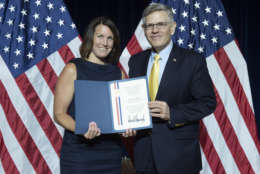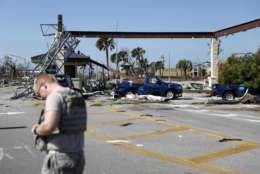climate change
-
In part 3 of Federal News Network's special report, agencies face a tricky question with the widespread success of telework: Does the federal government still need this much real estate, or can it downsize?
March 18, 2021 -
Climate change may not be an existential threat to the United States in the same way as nuclear or biological weapons. But it does negatively affect military operations both in the U.S. and around the world.
March 16, 2021 -
President Joe Biden wants the public sector to be an example for environmental sustainability. One of the biggest ways to reduce the U.S.’s carbon footprint is with real estate, as examined in this three-part special report.
March 16, 2021 -
The Postal Service, in a press release Tuesday, said the vehicles can be retrofitted to keep pace with advances in electric vehicle technologies.
February 23, 2021 -
In today's Federal Newscast, five years after the Office of Federal Procurement Policy issued guidance on reverse auctions, the Federal Acquisition Regulations Council is finally implementing it.
December 10, 2020 -
Climate change poses a fundamental risk to our economic system. A growing bipartisan movement is underway to make sure US financial regulators understand that, and act quickly.
October 07, 2020 -
In today's Federal Newscast, a group of Democratic senators want to remove the National Rifle Association Foundation from the list of approved charities on the Combined Federal Campaign.
September 21, 2020 -
The White House says a new agency-level appeals process for clearance denials could expose classified information, increase processing time.
September 21, 2020 -
Lawmakers probably won't have time to slip ideas to better space procurement in this year's defense policy bill.
August 03, 2020 -
A new report from the Ceres Accelerator for Sustainable Capital Markets says that climate change is another significant threat to the U.S. economy.
June 24, 2020 -
One group has advice for the Army on how to prepare for future climate challenges.
December 05, 2019 -
The Alaska pollock fishery in Alaska’s Bering Sea is one of the most abundant sources of sustainable fish in the world.
August 26, 2019 -
The main sticking point between the House and Senate versions is the topline number. The Senate bill authorizes an additional $17 billion for the Defense Department, which the House argues would be used for pet projects like the border wall.
July 15, 2019 -
Benjamin Colbert, founder of City Renewables, discusses how his business helps homeowners and companies convert their buildings to solar power, and how they can even make money by doing it.
July 05, 2019 -
A new report from the Government Accountability Office says DoD’s guidance for dealing with extreme weather is based on past weather patterns and doesn't take future projections into account.
June 21, 2019















